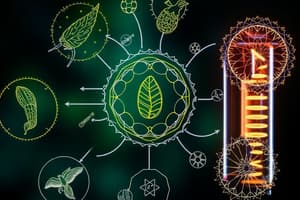Podcast
Questions and Answers
Which principle explains how organisms retain stable internal environments?
Which principle explains how organisms retain stable internal environments?
- Principle of homeostasis (correct)
- Gene theory
- Principle of adaptation
- Theory of evolution
What is the correct sequence of biological organization from simplest to most complex?
What is the correct sequence of biological organization from simplest to most complex?
- Atom → Molecule → Macromolecule → Cell (correct)
- Organ → Tissue → Organ System → Population
- Atom → Molecule → Cell → Organism
- Molecule → Cell → Tissue → Organ System
Which branch of biology focuses on the chemical processes within living organisms?
Which branch of biology focuses on the chemical processes within living organisms?
- Environmental Science
- Biophysics
- Biomedical Engineering
- Biochemistry (correct)
What does the gene theory state regarding DNA?
What does the gene theory state regarding DNA?
Which of the following is NOT a branch of biology?
Which of the following is NOT a branch of biology?
Which of the following best defines the field of ecology?
Which of the following best defines the field of ecology?
What is the basic unit of life?
What is the basic unit of life?
Natural selection primarily acts on which of the following?
Natural selection primarily acts on which of the following?
Which of the following disciplines focuses on the study of microorganisms?
Which of the following disciplines focuses on the study of microorganisms?
What is homeostasis in the context of biological systems?
What is homeostasis in the context of biological systems?
What role do genes play in biological systems?
What role do genes play in biological systems?
Which term describes the variety of life on Earth?
Which term describes the variety of life on Earth?
What is the primary focus of evolutionary biology?
What is the primary focus of evolutionary biology?
Flashcards
Cell Theory
Cell Theory
All living things are made of cells.
Gene Theory
Gene Theory
DNA holds the instructions for all cell functions.
Evolution
Evolution
Life changes over time.
Homeostasis
Homeostasis
Signup and view all the flashcards
Levels of Biological Organization
Levels of Biological Organization
Signup and view all the flashcards
Scientific Method
Scientific Method
Signup and view all the flashcards
Observation
Observation
Signup and view all the flashcards
Hypothesis
Hypothesis
Signup and view all the flashcards
Cell
Cell
Signup and view all the flashcards
DNA
DNA
Signup and view all the flashcards
Natural Selection
Natural Selection
Signup and view all the flashcards
Biology
Biology
Signup and view all the flashcards
Study Notes
Scientific Method
- Science is a systematic way of acquiring knowledge about the natural world.
- The scientific method is a process for acquiring this knowledge that involves:
- Observation: noticing something in the natural world.
- Question: formulating a question about what was observed.
- Hypothesis: proposing a possible explanation for the observation.
- Prediction: making a testable prediction based on the hypothesis.
- Experiment: designing and conducting a controlled test to see if the prediction is correct.
- Analysis: interpreting the results of the experiment.
- Conclusion: drawing a conclusion about whether the hypothesis is supported or not.
- The scientific method is iterative, meaning that the process may repeat multiple times before a conclusion is reached.
Biology
- Biology is the study of life and living organisms, including their structure, function, growth, origin, evolution, distribution, identification, and taxonomy.
- Biology is a broad field that encompasses several sub-disciplines, including:
- Cell biology: focuses on the structure and function of cells.
- Genetics: the study of genes and heredity.
- Ecology: the study of the relationships between organisms and their environment.
- Physiology: the study of the physical and chemical functions of living organisms.
- Microbiology: the study of microorganisms.
- Evolutionary biology: the study of the origin and diversification of life.
- Botany: the study of plants.
- Zoology: the study of animals.
- Molecular biology: the study of biological molecules.
Key Biological Concepts
- Cells: the basic unit of life.
- DNA: the genetic material that carries the instructions for building and maintaining an organism.
- Genes: specific sections of DNA that code for proteins.
- Evolution: the process by which populations of organisms change over time.
- Natural selection: a mechanism of evolution where organisms with traits better suited to their environment are more likely to survive and reproduce.
- Adaptation: the process by which organisms become better suited to their environment.
- Biodiversity: the variety of life on Earth.
- Ecosystems: the complex interactions between living organisms and their environment.
- Homeostasis: the process by which organisms maintain a stable internal environment.
- Metabolism: the chemical processes that occur within a living organism.
- Reproduction: the process by which organisms produce offspring.
Core Biological Principles
- The cell theory: all living things are composed of cells.
- The gene theory: DNA carries the genetic information needed for all cellular functions.
- The theory of evolution: life has evolved and diversified over time.
- The principle of homeostasis: organisms maintain a constant internal environment.
- The principle of adaptation: organisms adapt to their environment over time.
Branches of Biology and Related Fields
- Biochemistry: the study of the chemical processes within and relating to living organisms.
- Biotechnology: the use of biological systems or organisms to develop or make products.
- Biophysics: the study of biological processes using physical principles.
- Biomedical Engineering: a blend of engineering and biological science for the development of medical devices, diagnostics and therapies.
- Environmental Science: the study of the interaction between living organisms and their environment, addressing concerns like pollution and climate change.
Levels of Biological Organization
-
Atom → Molecule → Macromolecule → Organelle → Cell → Tissue → Organ → Organ System → Organism → Population → Community → Ecosystem → Biosphere
-
These levels illustrate increasing complexity of biological systems, with each level building upon the previous one.
Studying That Suits You
Use AI to generate personalized quizzes and flashcards to suit your learning preferences.




